Twelve Dawns in Trinyi
There was a soft tinkling and a slight shuffling. Everything was a blue black, the color of cold dawn, and I denied that it was time to move out of my warmth. The huge wooden doors to the prayer room opened and let in more dark air and cold mountain wind that plunged into the room. Ma muttered softly in Tibetan as she did every morning when all was dark. It was her way of summoning me for breakfast. It was 4:30, and wind flew through the mountain corridors; invisible and powerful. My bedroom smelled of wood and incense, and was adorned with pictures of the Dalai Lama and Buddhist deities. Yak butter candles stood unlit next to my bed. It was first day of harvest and the promise of labor waited. I climbed out from underneath an army of warmth and bumbled along into the main room of the house as torrents of wind ripped at my clothes.
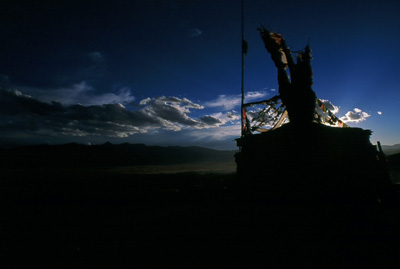
Once inside, Alo, the elder of the family and his grandson’s wife were huddled around the massive stove as a gas lamp gave off lemony light. The elder’s features were hidden by his tea bowl as he busily slurped his morning tea. The young girl shoved a bowl of Tibetan tea into my hands along with some barley powder to make Zhamba (a sticky mix of Barley and tea-rolled into balls). Alo smiled and nodded his head as if to say “now the day may begin.” The thick butter tea mixed with black leaves was presented to me hot and filling, and after the first couple of days my intestines had apparently dealt with the deluge of butter successfully. No words were said but it was comfortable silence. Their Chinese was limited and my Tibetan was limited—English wasn’t a choice. The massive wood stove roared in the dawning of a new day. Without warning, Alo started laughing, showing missing teeth and high red cheeks. His tanned hand motioned towards my hair—it was a running riot without a wash for a few days. Harvesting would begin in one hour. Barley fields waved and shimmied in the wind. By dusk it would be a flat naked field. This was to be my payment for accommodations and a taste of the gentle grit of an isolated Tibetan town for the preceding days of generosity.
This whole experience began with the words “Stay with my family in the village for a couple of nights.” That sealed what was to become one of the most moving experiences of my life. Dapka, a local trek leader and friend looked at me with his lean handsome features and said simply, “Afterwards you can go to your mountains.” He knew what magic was to be cast. The days to depart came and went in succession; the little knowledge gained daily, the unpretentious villagers gradually becoming accustomed to my presence contributing to a very ‘real’ feeling of being a part of something.
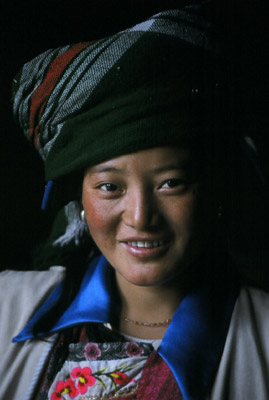
My destination was the Meili Xueshan Range (Kawa Karpo in Tibetan, Meili Snow Mountain). I had come to the conclusion two days into my stay here in the village that everything could wait. This was an opportunity to fully measure a human element and peek into lives that had been shaped by work, spirit and the land for centuries. It was, as I recalled later, the ultimate gift.
Driving to Trinyi from Zhongdian was a brief ride under a mountain sky changing colors as only mountain skies can. Gradually we hit a friendly dirt road, which headed into a valley, and I casually asked whether or not my hosts knew that I was coming. Dapka peered back at me and pursed his lips to utter, “They will be happy that you have come.” I rolled my eyes and said nothing. He smiled that gorgeous smile of his. These relatives of his didn’t have a clue that anyone was coming. I naïvely suggested giving them a call. He told me that when the phone did work it was usually stared at with disdain.
On arrival I was led into a huge walled house with two massive dogs with dreadlocks chained up. “Don’t get too close,” was all that was said which brought to mind what a Tibetan friend said, “Brief words bring deep meaning.” A dark hole that was the well sat outside the front door and it was then walking through the door that I met Ma. Words were exchanged and this lean, compelling woman with massive hands and a tanned iron face looked straight into me and for a moment I thought she might tell us to get lost. She nodded to Dapka, grabbed my 60 liter backpack and led me up some stairs into the prayer room at the end of the porch. This was to be my sleeping abode for the duration of my stay. Dapka started off with a smile and told me to just enjoy. I knew better than to ask questions. Whenever Tibetans purse their lips I had learned that answers wouldn’t necessarily be forthcoming.
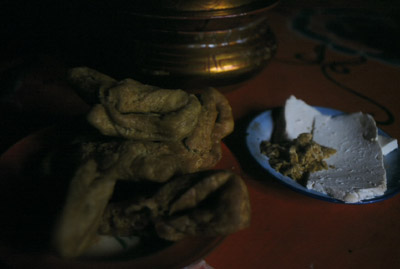
Shortly after Ma came in and beckoned me to lunch. Yak cheese with dried yogurt and sugar was served with Zhamba. The yak cheese was formed in a triangle and dried in a basket above an ancient wood stove. The sour taste was exactly the sort of thing my taste buds liked, and, of course the ubiquitous tea was served. Dinner was at five and consisted of a thick soup with some sort of root vegetable, tea and a discussion in rapid-fire Tibetan. Meals were experiences that I had to be careful of. Often I would forget that getting up at 5am meant that mealtimes were earlier, lunches were served shortly before 11 am, dinners at 5pm and that was that. I had to keep an eye on people, and when they headed back to their homes I headed home accordingly. One day while the local kids and I were playing ‘run after the pigs’ an ear-piercing yell ripped through the air. The kids were obviously used to it, but for me that omnipotent shout caused me to lurch forward. As my eyes scanned for the source, I finally saw Ma’s bright turban, a dot on the twelve-foot wall, waving those two huge hands signaling an immediate return. Never in an eternity would I ever dare to ignore this woman’s summons. It was time to eat, and I dutifully made my way back for a little feast.
My two ‘keepers’ Ma and Alo, were stunning displays of unpretentiousness and true graciousness. Ma was an immediate personification of strength. A work ethic and straightforwardness bordering on brutal purity made her an automatic target of my affections. Her husband drove supplies from isolated town to isolated town and was away for weeks on end. There was little she couldn’t do, and while she was lean of body, the sinews were born by a lifetime of endurance. Three-foot long braids wound down her back, and I often found myself just staring at this woman of the hills.
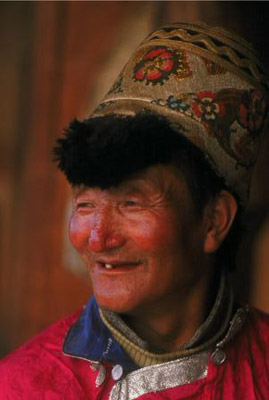
Her son was studying at a monastery in India; she was treated with the same deference by all in this little town in between mountains. Alo (Ma’s father-in-law), was a squinty eyed man whose face was pinched by nature’s elements. He carried around Zhamba balls in his deep pockets and used them to coax animals, snack on and throw at inflexible beasts. Rarely was Alo still, and he could generally milk yaks faster than two people.
One wet evening with a storm promising gray rage, we discovered that a particular yak (a chronic troublemaker) had disappeared. Tibetans referred to yaks as ‘grunting oxen,’ and witnessing the relationship between Alo and these black hairy beasts was part of the great pleasure I looked forward to every day. This grazing land was a two-hour walk into the mountains, and Alo looked to the mass of black forming above. He muttered something and in apparent impatience started chewing on a ball of Zhamba. He deftly threw a ball to me and beckoned me to follow. Rain held but wind slashed at us and seemed content to suck the air from our lungs. Making our way up, we finally sighted the obstinate bull. He seemed to know that he was in for trouble and stared as though awaiting sentence. Alo with his ancient abilities launched a good-sized Zhamba ball 20 feet that nailed our black horned friend in the nose. Some of Alo’s frustration came out with a wicked old smile of satisfaction afterwards. We made it halfway home before the sky let out its torrents. It was a bonding moment between us that needed no defining words.
He had long ago sustained an injury to his hip and needed a walking stick, which he made deadly use of whenever the occasion demanded. I knew that it wasn’t easy for him to accept his lame hip. Indeed, with his powerful wrists he seemed to relish throwing that stick about with reckless abandon. Pigs, dogs, chickens, and yaks alike knew better than to test him. Nothing here was drawn out and life and relations were direct and simple. Long ago I had learned that people living off the lands rarely wasted time.
We were in the land of Shangri La, a place of overt beauty on the southwestern edge of China. It was a land of huge skies and tribes that had their own history intertwined with the Chinese Dynasties for a thousand years. Bai, Naxi, Akha, and Tibetan tribes had occupied these lands, trading skills and bartering with 20 other tribes making it an unparalleled cultural place in the world. Gems throughout this area rested in valleys, sitting in the mountains offered a pure taste of a vibrant and physical life. Day to day life is carried out at a pace that is dictated by the fundamentals—weather, hunger and tradition.
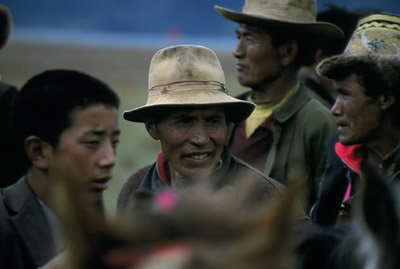
Trinyi was one such place. The population was entirely Khampas (the fiercely independent people of Eastern Tibet). Local dialect and dress were distinct and the women’s pink and red turbans could be seen bobbing amidst the fields. Days began at 5:00am and by 8:30pm lights were out and only the mountain winds were heard.
This little town of 50 households was at least seven centuries old and built according to traditions in this part of Kham and Yunnan. An outer wall protected an inner courtyard, and the ground floor was the dwelling for the raucous pigs and chickens. The inner sanctum was protected by a dog of massive proportions that seemed totally unconcerned with the food supply so close at hand. These dogs feared neither yak nor horse nor human, but they feared Ma and Alo. In fact I had learned to mimic Alo’s sounds so that the dogs might, if only briefly, rest easy around me. It was a minor success every day when the dogs cowered slightly as I made soft “cha” sounds.
For two days a collection of men, old, ancient and young gathered with their lean and eager horses for a display of horsemanship. Lean bodies hovered upon horses without saddles as they streaked over the green flat valleys. Bodies would lean out grazing the ground as hands collected silk ribbons on the green floor while the horses flew. The old men with their creased faces delighted that the young had not lost this primeval expertise. Time did not exist and for these afternoons under the moving clouds, it was an old world.
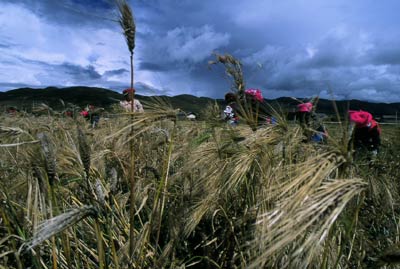 Seven days a week the morning ritual was the same: Milking yaks in the faltering dark, with only the sudden squirt sounds of milk in the tin bucket and little laughs and snips of sing song conversation. As the harvest time approached the families prepared. It was the women and their no nonsense approach who did most of the organizing. The night before we started the annual harvest, I was slapped on my back and pointed to my room by Ma. On my little black clock the time read 7:40pm. She knew what lay ahead while I remained happily ignorant. Sleep came easily with the cool silence and woody smells.
Seven days a week the morning ritual was the same: Milking yaks in the faltering dark, with only the sudden squirt sounds of milk in the tin bucket and little laughs and snips of sing song conversation. As the harvest time approached the families prepared. It was the women and their no nonsense approach who did most of the organizing. The night before we started the annual harvest, I was slapped on my back and pointed to my room by Ma. On my little black clock the time read 7:40pm. She knew what lay ahead while I remained happily ignorant. Sleep came easily with the cool silence and woody smells.
Families however distant worked together in teams. A long phalanx of women would cut with medieval scythes bending and dipping as a few of us would trail behind collecting the barley and putting them into piles. Then the last team would heave, stack and ease these masses onto a massive wheeled trailer. A tractor would show up, driven madly by a local teenager to take away the barley stacked up 30ft to dry. The women sang joyous tunes while working at a ferocious rate and seemed able to work while chatting, singing and resting. My hands were being shredded by work as I watched them. I consistently lost ground. The turbaned heads would peak back and the air would light up with laughter. I didn’t want to embarrass Ma. I plodded on with muscles starting to hint of something uncomfortable and when break time came with warm yak milk, I looked at my watch. It read 7:30am! Lunch arrived an eternity later, and we sat and drank tiny cans of tamarind juice between bites of buns and the omnipotent Zhamba. We moved from one field to another with all of the contributing members’ fields being similarly cut and stacked.
The rest of my day was endured and the ache in my back seemed to be eased by the sing song and rhythm of the women. There was a sort of pleasant haze settling over me as I watched the utter pleasure of people working together. All over this mountain region sitting on the eastern most plateau of the Himalayan Range, tight little villages played out this annual ritual.
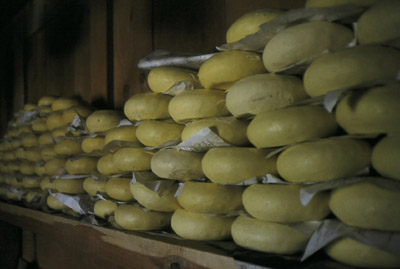
Due to time constraints we often miss the ‘in between’ places that sit nestled into valleys, places with no acclaim other than having maintained a way of life simply and successfully for centuries. These people knew full well about the ‘trappings’ of the outside world but were remarkably happy to return to the little village that was their home, as was I. Many locals are coming to the realization that much of their own grassroots culture is in fact more appealing than the huge gray monoliths of hotels springing up in nearby Zhongdian.
I had mentally set out a day of departure, fully aware that if I didn’t, I would not leave this place. In travelling, it always seems that just when you start delving into understanding a place you must depart. The night before I was to leave Ma came into my room and we just looked at one another. She then picked up my little alarm clock and shook it. While there were clocks in the home they were ancient and the hands had long since stopped their exercise. Now and then I would see her looking at my clock’s little green hands with delight, and it occurred to me then that this was to be my little gift to her. She understood my intention immediately and tucked it into the folds of her long dress and hustled off.
I felt leaden and grumpy the morning of my departure. Ma was working in the fields and Alo gave me a massive Zhamba ball to keep me from hunger. When I started to say bye to Ma, Alo’s muscular forearms guided me to a waiting truck. I understood. Ma’s turban looked up briefly then set down to work again with a little smile. There was no need for garish good-byes. The time we had together was enough.
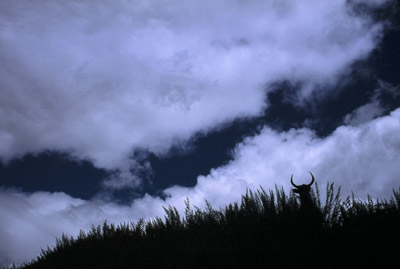
Under the snow peaks of the Kawa Karpo range a week later, my memories of that little town would at times overwhelm the spectacular snow caps around me. Fate had conspired to treat me to more than just stupendous natural splendor. Sometimes on the way to a destination one gets sidetracked for whatever reasons, and that ‘sidetrack’ in fact becomes something that moves you far beyond words. As glorious as any landscape is, people inevitably affect the perception of a place and leave the deepest impression. Let’s just hope the impressions we leave are as favorable.
